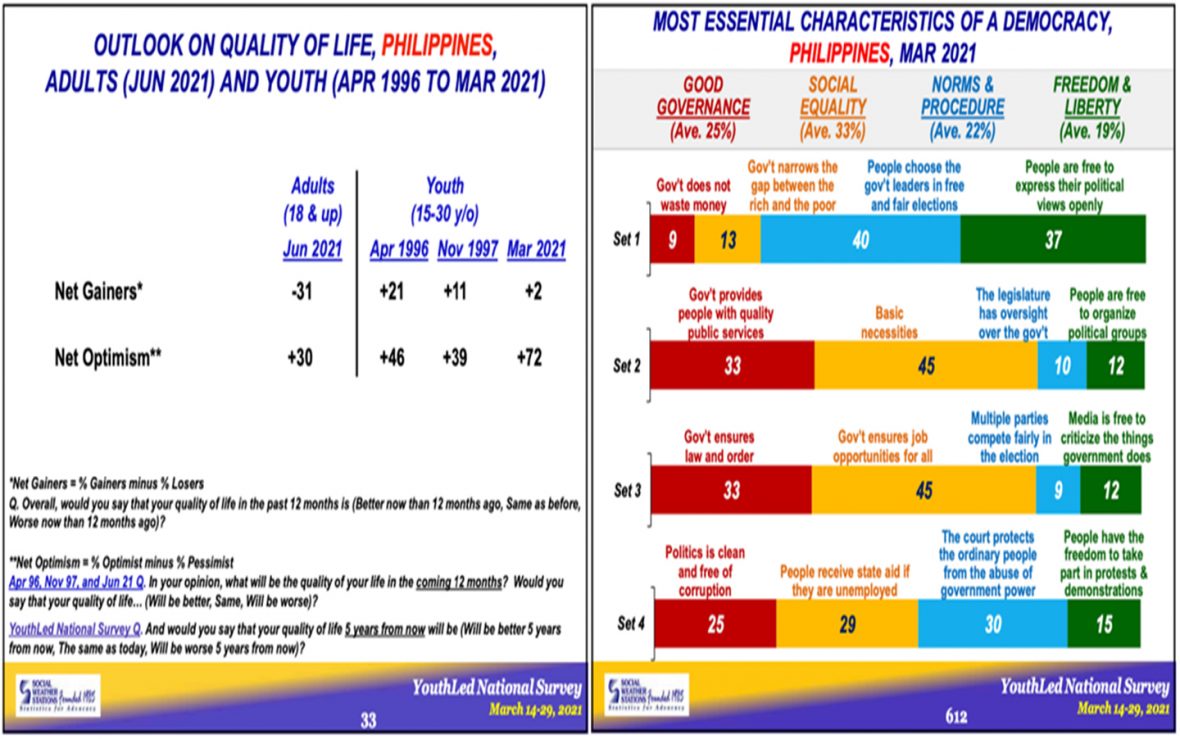Mandaluyong City, Manila – Youth Leadership for Democracy (YouthLed) in partnership with the Social Weather Stations (SWS) has conducted a national youth survey to gain more understanding and insight on the wellbeing and aspirations, civic participation, and political participation of Filipino Youth in a survey and report called “The State of the Filipino Youth 2021”.
The survey, which was designed to provide a comprehensive insight on the Filipino youth was conducted in March 14-29, 2021, across all regions in the country and in select major cities and vote-rich areas. The respondents are composed of 4,900 youth between the ages of 15-30 years old, majority of which (81%) are Class D which represent the largest bulk of families in the Philippines. The last youth survey of this scale was conducted by SWS in 1996.
Filipino Youth Wellbeing and Aspirations
Survey results reveal that young Filipinos outlook on their quality of life has a net optimism score of +72 compared to youth in 1996 at +46 and adults in 2019 at +30. Seventy-six percent of youth say that their quality of life will improve in the next five years. This is followed by 18% who say it will stay the same and only 4% who say it will worsen.
A large majority of young Filipinos also feel pride in being a Filipino at 81%, compared to young Filipinos in 1996 at 69%.
In terms of aspirations, majority of youth (72%) say that their goal is to help parents and siblings financially. When asked about work opportunities, 33% say that they have enough good opportunities from where they are based while only 8% say that they prefer working and living abroad than in the Philippines.
Despite a period of lockdowns during the pandemic, 67% of young Filipinos say that they have good health. This is higher compared to the same question for adults in June 2019 (63%) and to the for youth in April 1996 (51%).
Filipino Youth and Civic Participation
The survey also revealed that youth are more inclined towards individual civic political action and issue-based collective action. Individual engagement include liking or sharing posts on social media and seeking out news on political issues. Youth are also more likely to take action on issues that need to be addressed such as poverty, violence and abuse against women and children, lack of access to quality education, climate change, and response to the COVID-19 crisis, among other issues.
According to Natalie Christine Jorge, Chief of Party of Youth Leadership for Democracy, “Results show us that young Filipinos are more inclined toward individual civic political action online and on issue-based collective action. There is less interest on politics but more focus on social issues and social change. By allowing this generation of young Filipinos to organize, express themselves this way, we pave the way for stronger democratic engagement.”
Youth organizations (45%) also serve as the main point of entry for youth participation and leadership.
In finding references on the responsibilities of a Filipino citizen, the top five sources of information among the youth is the home (24%), traditional mass media (20%), high school (17%), social media (16%), college (5%), and community organization (5%).
Filipino Youth and Political Participation
Eighty-six percent of Filipino youth believe that they can make a change in society by actively campaigning and voting for candidates they believe in for the upcoming elections. When asked if they agree that elections in their precinct will be clean, safe, and proper, 75% agreed with this statement. This agreement is strong in Mindanao (84%), Visayas (77%) and Luzon (72%) while good in Metro Manila (63%).
Survey results reveal that the strongest influence in Filipino Youth’s decision on whom to vote for in the national level is the endorsement of one’s family at 54%, political experts at 29%, traditional media and community leaders both at 19% each, and close friends at 18%. These findings remain consistent across all age groups and socio-demographic status.
Similar with the decision on whom to vote for, youth also look to family (59%) as a guide on their stance on political issues and look to their family (57%) as a guide on their support for government policies and activities.
Jorge adds, “These results highlight and give focus to the family as the main political influencer for Filipino youth. This can serve as a guide for civic education and voter education entry points, looking to the family as political units, community and family focused advocacy campaigns and civic education for parents and communities. We also see the youth as becoming political influencers in their families and communities.”
Youth also find traditional media very reliable and factual (20%) than social media (7%). A significant amount of youth prefer TV news coverage as sources of information about electoral candidates (45%)
Filipino Youth and Democracy
The national youth survey also show that majority of Filipino at 70% are satisfied with the way democracy works in the country, compared to 55% in 1996. Satisfaction with democracy is higher in the region of Davao del Norte (96%) compared to Ilocos (77%), Bicol (53%), Central Visayas (70%), and Metro Manila (55%).
Also included in the 2021 Youth Survey is a question on the meaning of democracy using the Asian Barometer Survey questionnaire. The results show that the most essential characteristics of democracy are social equality (33%), followed by good governance (25%), norms and procedures (22%), and freedom and liberty (19%).
Following the findings of the survey, YouthLed will be launching focus group discussions (FGDs) to validate and gain more insights from the youth across the country. The highlights of the survey will be released to the public in February 2022.
Youth Leadership for Democracy (YouthLed) is a program that aims to increase civic engagement leading to strengthened participation in democratic governance. The YouthLed program is composed of leadership development, coalition-building, and civic education and engagement activities for the Filipino youth.

